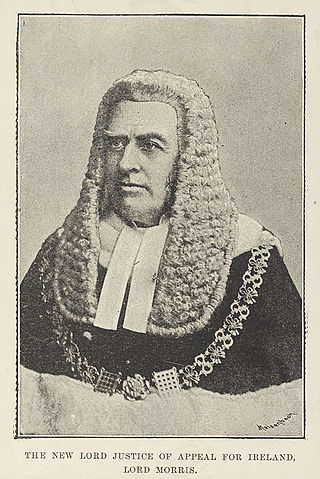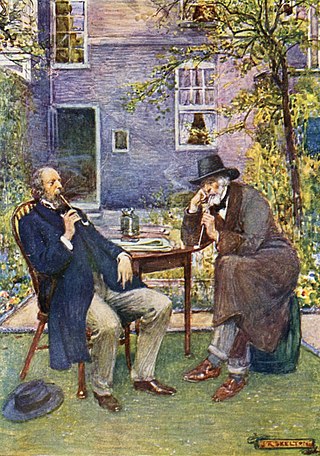Related Research Articles

Charles John Huffam Dickens was an English novelist, journalist, short story writer and social critic. He created some of literature's best-known fictional characters, and is regarded by many as the greatest novelist of the Victorian era. His works enjoyed unprecedented popularity during his lifetime and, by the 20th century, critics and scholars had recognised him as a literary genius. His novels and short stories are widely read today.

A Christmas Carol. In Prose. Being a Ghost Story of Christmas, commonly known as A Christmas Carol, is a novella by Charles Dickens, first published in London by Chapman & Hall in 1843 and illustrated by John Leech. It recounts the story of Ebenezer Scrooge, an elderly miser who is visited by the ghost of his former business partner Jacob Marley and the spirits of Christmas Past, Present and Yet to Come. In the process, Scrooge is transformed into a kinder, gentler man.
The Master of the Revels was the holder of a position within the English, and later the British, royal household, heading the "Revels Office" or "Office of the Revels". The Master of the Revels was an executive officer under the Lord Chamberlain. Originally he was responsible for overseeing royal festivities, known as revels, and he later also became responsible for stage censorship, until this function was transferred to the Lord Chamberlain in 1624. However, Henry Herbert, the deputy Master of the Revels and later the Master, continued to perform the function on behalf of the Lord Chamberlain until the English Civil War in 1642, when stage plays were prohibited. The office continued almost until the end of the 18th century, although with rather reduced status.
Sir Thomas Duffus Hardy was an English archivist and antiquary, who served as Deputy Keeper of the Public Record Office from 1861 to 1878.

The Lord Chancellor, formally titled Lord High Chancellor of Great Britain, is a senior minister of the Crown within the Government of the United Kingdom. The lord chancellor is the minister of justice for England and Wales and the highest-ranking Great Officer of State in Scotland and England, nominally outranking the prime minister. The lord chancellor is appointed and dismissed by the sovereign on the advice of the prime minister. Prior to the union of England and Scotland into the Kingdom of Great Britain, there were separate lord chancellors for the Kingdom of England and the Kingdom of Scotland. Likewise, the Lordship of Ireland and its successor states maintained the office of lord chancellor of Ireland until the establishment of the Irish Free State in 1922, whereupon the office was abolished.

The Lord Keeper of the Great Seal of England, and later of Great Britain, was formerly an officer of the English Crown charged with physical custody of the Great Seal of England. This position evolved into that of one of the Great Officers of State.

Roundell Palmer, 1st Earl of Selborne, was an English lawyer and politician. He served twice as Lord High Chancellor of Great Britain.
The Lord High Chancellor of Ireland was the highest judicial office in Ireland until the establishment of the Irish Free State in 1922. From 1721 to the end of 1800, it was also the highest political office of the Irish Parliament: the Chancellor was Speaker of the Irish House of Lords. The Lord Chancellor was also Lord Keeper of the Great Seal of Ireland. In all three respects, the office mirrored the Lord High Chancellor of Great Britain.

The Attorney-General for Ireland was an Irish and then, from 1801 under the Acts of Union 1800, United Kingdom government office-holder. He was senior in rank to the Solicitor-General for Ireland: both advised the Crown on Irish legal matters. With the establishment of the Irish Free State in 1922, the duties of the Attorney-General and Solicitor-General for Ireland were taken over by the Attorney General of Ireland. The office of Solicitor-General for Ireland was abolished at the same time for reasons of economy. This led to repeated complaints from the first Attorney General of Ireland, Hugh Kennedy, about the "immense volume of work" which he was now forced to deal with single-handedly.

Victorian literature is English literature during the reign of Queen Victoria (1837–1901). The 19th century is considered by some the Golden Age of English Literature, especially for British novels. In the Victorian era, the novel became the leading literary genre in English. English writing from this era reflects the major transformations in most aspects of English life, from scientific, economic, and technological advances to changes in class structures and the role of religion in society. The number of new novels published each year increased from 100 at the start of the period to 1000 by the end of it. Famous novelists from this period include Charles Dickens, William Makepeace Thackeray, the three Brontë sisters, Elizabeth Gaskell, George Eliot, Thomas Hardy, and Rudyard Kipling.

The Lords Justices were deputies who acted collectively in the absence of the chief governor of Ireland as head of the executive branch of the Dublin Castle administration. Lords Justices were sworn in at a meeting of the Privy Council of Ireland.

Alan Brodrick, 1st Viscount Midleton, PC (Ire) was a leading Irish lawyer and Whig politician who sat in the Parliament of Ireland between 1692 and 1715 and in the British House of Commons from 1717 to 1728. He was Speaker of the Irish House of Commons and Lord Chancellor of Ireland. Although he was a man of great gifts, he was so hot-tempered that even Jonathan Swift is said to have been afraid of him.
Sir Roger Jones, 1st Viscount RanelaghPC (Ire) was joint Lord President of Connaught with Charles Wilmot, 1st Viscount Wilmot. He commanded the government forces in Connaught during the Irish Rebellion of 1641 and the beginning of the Irish Confederate Wars defending Athlone against James Dillon until February 1643.
The bibliography of Charles Dickens (1812–1870) includes more than a dozen major novels, many short stories, several plays, several non-fiction books, and individual essays and articles. Dickens's novels were serialized initially in weekly or monthly magazines, then reprinted in standard book formats.
The Master of the Rolls in Ireland was a senior judicial office in the Irish Chancery under English and British rule, and was equivalent to the Master of the Rolls in the English Chancery. Originally called the Keeper of the Rolls, he was responsible for the safekeeping of the Chancery records such as close rolls and patent rolls. The office was created by letters patent in 1333, the first holder of the office being Edmund de Grimsby. As the Irish bureaucracy expanded, the duties of the Master of the Rolls came to be performed by subordinates and the position became a sinecure which was awarded to political allies of the Dublin Castle administration. In the nineteenth century, it became a senior judicial appointment, ranking second within the Court of Chancery behind the Lord Chancellor of Ireland. The post was abolished by the Courts of Justice Act 1924, passed by the Irish Free State established in 1922.

Sir Arthur Ingram was an English investor, landowner and politician who sat in the House of Commons at various times between 1610 and 1642. The subject of an influential biography, he has been celebrated for his "financial skill and ruthless self-interest", and characterized as "a rapacious, plausible swindler who ruined many during a long and successful criminal career". Probably of London birth but of Yorkshire background, he was a very extensive landowner in Yorkshire. He acquired and rebuilt the former Lennox residence at Temple Newsam near Leeds, which became the principal seat of his family, including the Lords Ingram, Viscount Irvine and their descendants, for over 300 years.
Thomas Cranley DD a.k.a. Thomas Craule was a leading statesman, judge and cleric in early fifteenth-century Ireland, who held the offices of Chancellor of Oxford University, Archbishop of Dublin and Lord Chancellor of Ireland.

The Crown Office in Chancery is a section of the Ministry of Justice. It has custody of the Great Seal of the Realm, and has certain administrative functions in connection with the courts and the judicial process, as well as functions relating to the electoral process for House of Commons elections, to the keeping of the Roll of the Peerage, and to the preparation of royal documents such as warrants required to pass under the royal sign-manual, fiats, letters patent, etc. In legal documents, the Crown Office refers to the office of the Clerk of the Crown in Chancery.
References
- 1 2 3 "Chafe-wax". Oxford English Dictionary. Retrieved 12 November 2017.
- ↑ "Chafe". Oxford English Dictionary. Retrieved 12 November 2017.
- ↑ Dickens, Charles (19 October 1850). "A Poor Man's Tale of a Patent". Household Words. London. Retrieved 12 November 2017.
- ↑ Grimble, Augustus (1896). The Deer Forests of Scotland. K. Paul, Trench, Trübner & Company, Limited. pp. 247–248. Citing Braemore Visitors Book for Sept 28, 1874, entry by Sir William Harcourt, undernoted by Lord Cairns